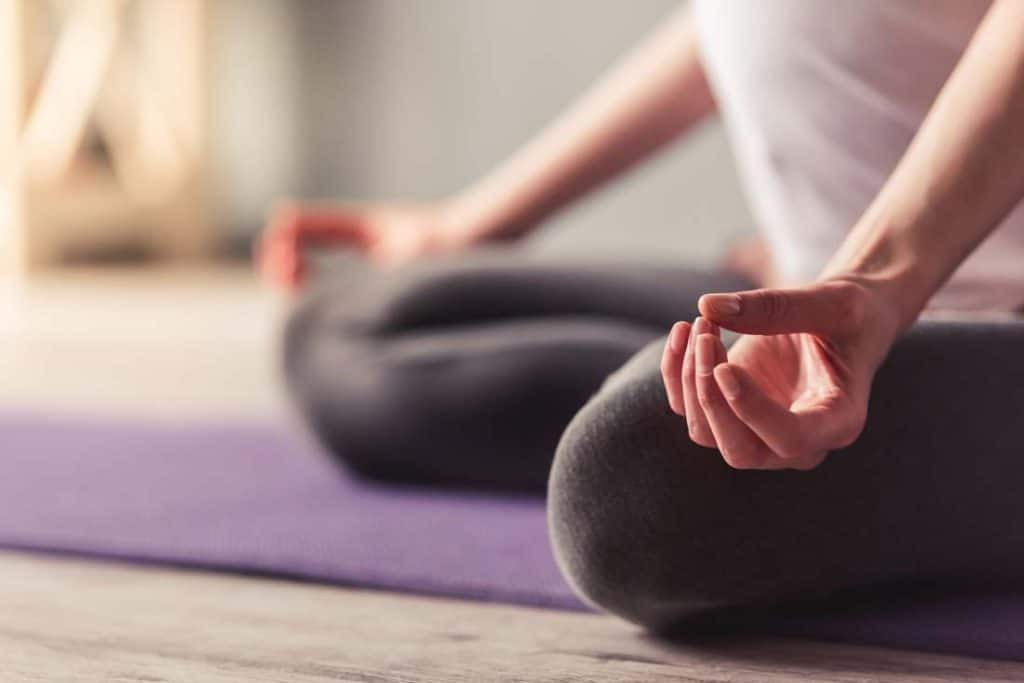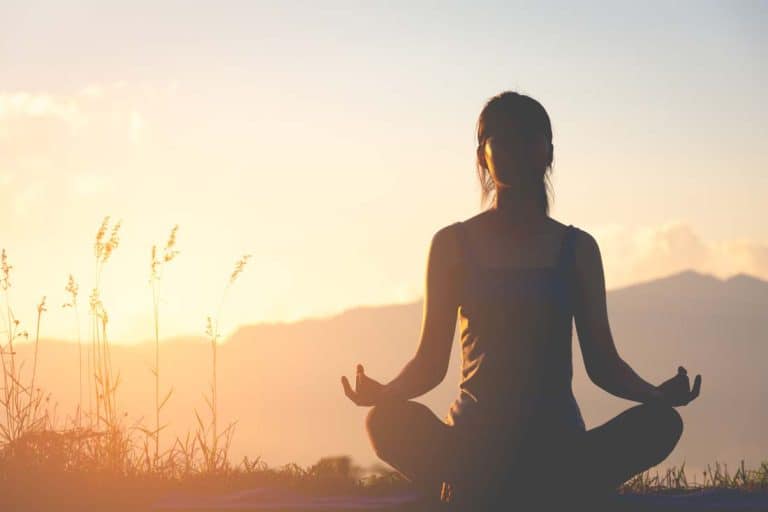Meditation and sleep both have their benefits. They decrease stress, increase focus, and help keep the mind and body healthy. They have so many benefits that they are both recommended in healthcare settings. For example, many people pursue meditation in holistic therapy to treat addiction and mental health disorders.
Meditation and sleep have so much in common that many people wonder about meditation vs sleep and whether there is any real difference between the two. Both can have great benefits for your personal or business growth. However, while both practices often overlap, they have some distinct differences.
What Is Meditation?

Meditation, like sleep, involves quieting the mind and reaching a state of deep relaxation. Unlike sleep, however, meditation requires the practitioner to remain conscious.
Meditators focus on their breathing, a mantra, or an object during their practice, or they may try to clear their thoughts completely.
Many beliefs and practices use meditation, so people may practice it differently. Different meditation practices include:
- Mindfulness 10-minute meditation: a practice that develops a sense of awareness. Practitioners observe their thoughts and surroundings while meditating.
- Loving-kindness meditation: meditation that focuses on giving and receiving love
- Progressive relaxation: a technique that involves relaxing one muscle group at a time
- Zen meditation: a Buddhist practice involving various poses and a focus on spiritual insight
- Transcendental meditation: meditating by focusing on a mantra
All these practices have in common a state of altered consciousness, either through heightened mindfulness or a loss of surface-level awareness.
What Happens in The Body During Meditation?

Many people already know that meditation positively impacts the mind, but it also impacts the body. Though it’s not the same as falling asleep, meditation does help the body achieve a more restful state.
Several things happen to the body during meditation. As the brain becomes more relaxed, the body responds by doing the same.
Many forms of meditation focus on slowing the breath. When the meditator takes slow breaths, the parasympathetic nervous system calms the body. Unlike the sympathetic nervous system, which is in charge of the body’s “fight or flight” response, the parasympathetic nervous system allows the body to slow down and relax.
When this happens, the body’s level of cortisol drops. Cortisol is a stress hormone, and while it does have a place, too much cortisol has a negative impact on the body.
Cortisol increases when a person perceives a threat, such as a wild animal. The increase in cortisol helps the body respond to the threat more effectively.
However, the human body can’t tell the difference between a wild animal and the kind of stressors we experience every day, such as deadlines. The body will still release cortisol as a response to these non-life-threatening struggles.
If these struggles are constant, the cortisol will remain constant as well, which can cause several stress-related health issues, including:
- Headaches
- Muscle pain
- Tension
- Cardiovascular issues
- Insomnia
- Difficulty concentrating
Regulating cortisol can help people fight inflammation and mitigate these health issues. The more a person practices meditation, the more their body can reduce its cortisol and the effects of chronic stress.
What Happens in the Brain During Meditation?
As a person meditates, their mind becomes focused and calm.
This state of calmness may not happen right away. Some people must practice meditation for several days before the focus becomes automatic. At first, many people find that when they sit down to meditate, they focus instead on their to-do lists and other distractions.
However, these distractions are normal, and with practice, it becomes easier to reach the desired state of tranquility. Once a person can achieve a meditative state, several things happen to the brain.
In the short term, brain waves change. Fast brain waves, associated with thinking, working, and planning, move aside in favor of slow brain waves, including the alpha and theta brainwaves associated with sleep.
This slowed brain activity is part of what makes meditation such a restful activity. Alpha and theta waves are connected to feelings of relaxation, reduced anxiety, and increased creativity.
Over time, meditation may also strengthen the brain by increasing its gray matter. Gray matter performs several tasks in the brain. It plays a big part in memory and emotion. As a result, over time, people who meditate may gain better emotional control and sharper recall skills.
What Is Sleep?

Sleep is a period of deep rest in which a person loses consciousness. It is a time of reduced activity and diminished reactions to sensory input.
This process helps the brain and body heal, retain memories, improve learning, and much more. One of the primary differences between sleep and meditation is that sleep is often a longer, deeper process.
During the earliest sleep stages, a person enters a “twilight” phase between sleep and wakefulness as their body prepares for deep sleep. They can be awakened easily during this time.
Then, the person will enter deeper stages of sleep, in which the muscles become temporarily paralyzed, nonessential systems take a break, and the body begins to repair itself. Deep sleep is also when dreams occur.
It can be difficult to wake a person during deep sleep, and somebody who does wake up during deep sleep may feel disoriented.
Throughout the night, a sleeping person will cycle through light and deep sleep phases multiple times. Ideally, they will wake up in the morning during the lightest phase of sleep, which makes it easier to get out of bed.
What Happens in the Body During Sleep?

Sources on sleep note that several things happen to the body during this time.
During sleep, the body begins to repair itself, healing from major injuries and daily life’s wear and tear. The body accomplishes this healing in several ways.
- Increased human growth hormone: This hormone is released during sleep, helping the body to rebuild and repair itself.
- Cell regeneration: Cells repair or duplicate themselves throughout the body.
- Increased blood flow: The muscles experience an increased blood supply, which supports healing and repair.
- Decreased cortisol: Cortisol causes inflammation, which can be detrimental to healing. During sleep, cortisol levels drop.
All these processes are essential for the body to stay healthy and strong, which is why sleep deprivation is associated with many physical health issues.
What Happens in the Brain During Sleep?
Several important things happen to the brain during sleep. One of those things is dreaming, which involves a series of mental images and other imagined sensations.
Multiple brain regions are involved in the dreaming process, and researchers aren’t sure why dreams happen.
They do, however, have several theories. For example, some psychologists have proposed that dreams allow humans to process their experiences and emotions. Others view dreams as a way for people to “practice” different scenarios in a safe environment.
In any case, people have different experiences with dreams. Most dreams are forgotten when the person wakes up, but some are remembered. Some people can become aware that they are dreaming while in the middle of a dream, a phenomenon known as “lucid dreaming.”
Dreams have even served as inspiration for art and literature. The most famous example may come from Mary Shelley’s Frankenstein, inspired by the author’s dream.
Another important thing that happens during sleep is memory retention. Sleep research suggests that slow-wave sleep, or deep sleep, helps the brain solidify short-term memories and turn them into long-term memories.
The Difference Between Meditation and Sleep
During sleep and meditation, important processes happen in the brain and body. However, a few differences set these two practices apart from one another.
Meditation Vs Sleep: How We Feel Afterward
How we feel after sleep and meditation is subjective. It depends on the length, quality, and effectiveness of both.
Ideally, after sleeping, a person will feel well-rested and energized. They may take some time to transition to the waking world and feel groggy, but they should feel refreshed after a quality night’s sleep or a power nap.
However, how a person feels after sleeping will depend on a few factors, including how much sleep they got and when they woke up. For example, if an alarm clock wakes a person in a deep sleep cycle, they may feel especially tired, confused, and reluctant to get out of bed. The resulting grogginess may stay with the person for the rest of the day.
Many people struggle to form thoughts and perform tasks immediately after waking up, and it’s normal to need some time to gain alertness. For many people, the mind feels a little muddled after sleeping.
After meditation, a person’s feelings may depend on how many times they’ve practiced. For someone who is new to meditation, the first few sessions may not produce the desired results. At first, it can be difficult to quiet the mind and reach an altered state of consciousness.
However, after some practice, many people report that meditation leaves them feeling calm, relaxed, and focused. Meditation often provides an immediate level of alertness. It doesn’t generally leave people feeling like they need time to “wake up” or regain control over their thoughts. People may have an easier time performing complex tasks after meditating than they would after sleeping.
Meditation Vs Sleep: The Breath
Our breathing varies throughout the day, adjusting based on activities. Sometimes, the breath is deep and slow. At other times, it is fast and shallow. For example, if you’re sitting at your desk, your breathing will be different than if you were singing a song or taking a walk.
During meditation and sleep, however, we take slower, deeper breaths. This deep breathing is part of what activates the parasympathetic nervous system and deactivates the fight or flight system.
However, there are two big differences between the breath during meditation and the breath during sleep.
First, during meditation, the breath remains fairly steady throughout the process. During sleep, on the other hand, the breath changes during a phase called REM sleep.
REM stands for “rapid eye movement,” as the eyes move back and forth quickly during this phase. Most dreams happen during REM sleep because the brain produces a lot of activity at this time.
According to Harvard sleep research, breathing becomes more shallow and less predictable during this high-activity phase. In fact, it can compare to people’s breathing patterns while awake.
Second, we have more control over our breath during meditation. When we breathe deeply during meditation, it’s because we’ve made a conscious choice, especially during practices such as mindfulness meditation. However, deep breathing occurs automatically during sleep rather than as a conscious choice.
Meditation Vs Sleep: Awareness & Consciousness
While meditation requires the participant to remain awake and somewhat conscious, sleep requires a complete loss of consciousness. In a certain sense, that consciousness is regained during the dream phase when rapid brain activity resumes.
However, just because meditation requires consciousness does not mean it’s not a restful activity. Because it slows brain waves and relaxes the body, meditation does help people rest.
Some meditation research says that meditation may decrease a person’s need for sleep. While the research does not provide concrete answers yet, we do know that meditation improves reaction times in people who are sleep deprived.
How Are Meditation and Sleep Similar?
When looking at sleep and meditation differences, many people also notice similarities. Meditation and sleep may have more similarities than differences.
Of course, as mentioned above, both meditation and sleep cause slowed brain waves.
Furthermore, sleep and meditation share important outcomes that benefit people’s health. According to recent studies, these benefits may include:
- Reduced mood disorder symptoms
- Reduced anxiety
- Improved responses to stress
- Lower blood pressure
- Reduced cravings in people with substance use disorders
- Reduced PTSD symptoms
- Better cognition
Which Is Better: Sleep or Meditation?
Objectively, neither choice is “better” than the other between sleep and meditation. Both are beneficial under different circumstances.
Many people wonder, if they have 20 minutes to meditate, why they shouldn’t just take a nap instead. After all, falling asleep doesn’t usually require practice, and for many people, sleep is simply easier than meditation.
However, there are some moments that call for sleep, while others may call for meditation instead. When considering the question of meditation vs sleep, it’s important to keep a few key things in mind.
First, understand that nothing, including meditation, can replace sleep entirely. Humans have a biological need for sleep, much like they have a biological need for food. Sleep deprivation will eventually kill a person if it persists long enough.
People experience impaired mood, poor reflexes, poor decision-making skills, and more without sleep. When people become exhausted enough, their bodies can force them to sleep even if they try to stay awake. This can happen during unsafe times, such as when the person is behind the wheel of a car.
If you ever ask yourself about replacing sleep with meditation, sleep will always be the safest choice.
Otherwise, whether you should sleep or meditate depends on the circumstances. Sleep makes a good choice if it’s close to bedtime, if you need long-term rest, or if you’re healing from an illness or injury.
Meditation, however, makes a good choice if you need immediate alertness. It also makes a great choice if you only have a few minutes or can’t find a place to nap.
Some may choose meditation if taking a power nap isn’t an option. A “power nap” is a nap that only lasts for 20 minutes or less. Many sleep experts believe that this length is ideal because it doesn’t give the body a chance to enter deep sleep. Therefore, the napping person can wake up refreshed instead of groggy.
However, many people take longer than 20 minutes to fall asleep, and they may struggle to determine how much time they need to drift off. For these individuals, it can be tough to find an ideal nap length. Meditation can provide a restful alternative.
However, if you set aside different times for sleep and meditation, you do not have to choose one or the other. Studies show that meditation can improve sleep quality. Because meditation relaxes the body and mind, it can help people fall asleep more easily.
Conclusion

Overall, sleep and meditation can make a difference in health and wellness. Using both regularly can help you approach the day with more clarity. If you’re unsure whether you need a power nap or a meditation session during stressful moments, try using both methods during the week and gauge how you feel afterward.
As mentioned above, some moments may call for sleep, while others may be better suited for meditation. Take note of how your body and mind feel and find a method that works for you, depending on the circumstances.
While meditation can seem more complicated if you’re trying it out for the first time, once you get into a good rhythm, you’ll reap the rewards of calming your mind, body, and spirit for a few minutes each day.
Did you find our meditation vs sleep article interesting? Then also read about the
